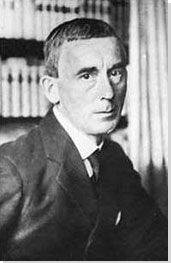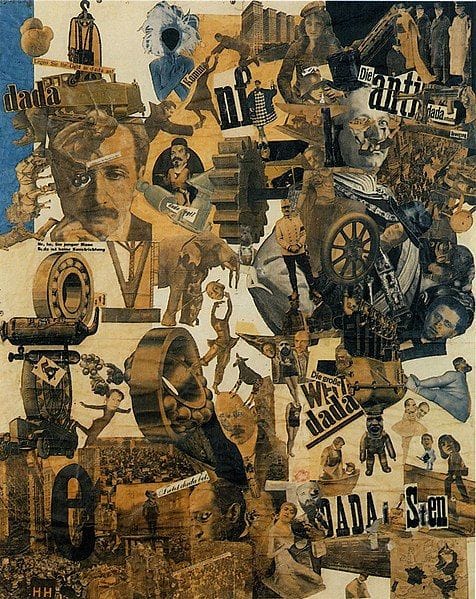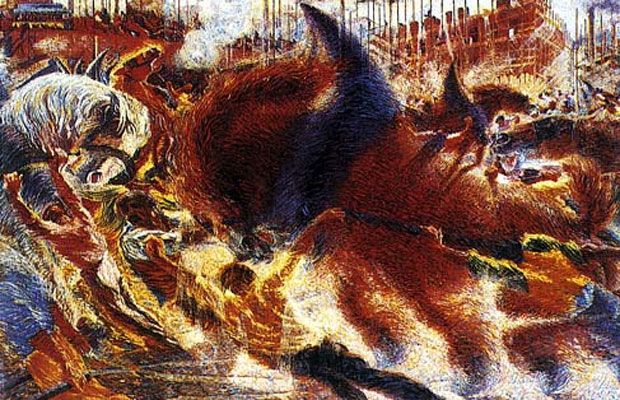Summary of Hugo Ball
Hugo Ball's major contribution as leader and co-founder along with his girlfriend, cabaret performer, Emmy Hennings, of the Dada movement, was to articulate the collective's radical nihilistic and iconoclastic ideology. It was this first group in Zurich that spawned important international offshoots in Paris, Berlin, and New York. In their First Dadaist Manifesto, written by Ball in 1916, the early Dadaists who met at the Cabaret Voltaire explained how their new movement was a direct revolt against the prevailing bourgeois aesthetic and social values of the West and against society's glorification of war and violence.
Ball's sound poems such as Karawane (1916) and Katzen and Pfauen (1916) exemplified Dada's ironic, nonsensical, and playful yet deadly serious critique of Western culture. A prolific writer and well-educated in German history, philosophy, and literature, Ball also drafted a number of other experimental writings, including a novel, an extensive diary, and several scholarly works.
By 1920, Ball returned to the Catholicism of his early life and immersed himself in the mysticism of early medieval Christian saints. He retired with Hennings to a tiny Swiss village, Agnuzzo, where he began the process of revising his diaries from 1910 to 1921, which were later published under the title, Die Flucht aus der Zeit (Flight Out of Time). The diaries provide a wealth of information concerning the people and events of the Zurich Dada movement. Ball died quite young, at age 41 in 1927, poor, a religious zealot, in self-imposed isolation and all but forgotten. He had become the epitome of the Dadaists as he once described them: a person "still so convinced of the unity of all beings, of the totality of all things, that he suffers from the dissonances."
Accomplishments
- In keeping with the deliberately contradictory aspect of Dada - to be playful and deadly serious at once - Ball explained the source of the name of the movement, writing, "Dada comes from the dictionary. It is terribly simple. In French, it means 'hobby horse.' In German, it means 'Goodbye,' 'Get off my back,' 'Be seeing you sometime.' In Romanian: 'Yes, indeed, you are right, that's it. But, of course, yes definitely right.' And so forth." And at the same time, he insisted that Dada was also intended to challenge its audience's firmly held beliefs about the state of the world - in particular the chaos and bloodshed of the First World War.
- While Ball and the Cabaret Voltaire were essential to the founding of the Dada movement, by 1917, the momentum of the previous year began to wane. Artists moved on. The next stop for many was the Galerie Dada at Bahnhofstrasse 19 in Zurich. Major Dadaist groups developed in Berlin, Paris, and eventually New York City, all of which endured for much longer than had the original group based at the Cabaret Voltaire. But Ball, Hennings, Tzara and others had inspired the revolution - although the ways in which individual artists and groups interpreted and carried out the aims of Dada varied wildly.
- The aesthetic of Ball's poems and costumes was always secondary to the essential ideas they conveyed. The visual artists in the movement, like Ball, embraced the use of unconventional materials like cardboard from which he constructed his outrageous costume for his performance of Karawane. "For us," he wrote, "art is not an end in itself, but it is an opportunity for the true perception and criticism of the times we live in." Thus, a hastily fabricated cardboard costume in which he resembled an eccentric cleric while reciting a provocatively nonsensical sound poem - and the poem itself - were vehicles for achieving a larger aim: to dismantle language, particularly as it pertained to imperialism, patriotism, and war.
Important Art by Hugo Ball
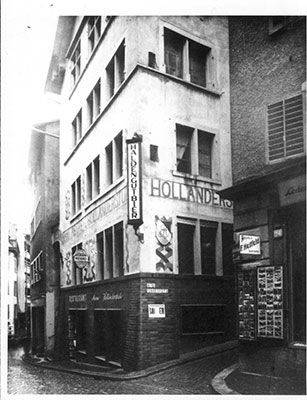
The Cabaret Voltaire, Zurich, Switzerland
Hugo Ball met cabaret singer, Emmy Hennings in Munich in the middle of 1915. Together they fled to Zurich to avoid the turmoil of war. In February 1916, the couple opened the Cabaret Voltaire where Dada was born. There Ball organized and promoted Dada events, including performances in which he participated - most often reciting his sound poems. Other founding members of the original Zurich group were Tristan Tzara, Richard Huelsenbeck, Marcel Janco, Sophie Tauber, and Hans Arp.
Technically a nightclub, the Cabaret Voltaire was a lively hub where the artistic and political activity of the anarchic Dada movement could be freely undertaken. It was, in essence, a living example of the Dada Manifesto, which Ball drafted and read aloud at the first public Dada soiree on July 14, 1916. As the leader of the group, Ball articulated their philosophy to destroy and clear away the refuse of "the rationalized language of modernity," which for them was emblematic of the "agony and death throes of [the] age."
Most often, the Cabaret Voltaire offered music, dance, and spoken word performances and the events could be quite raucous and chaotic with audience members just as often baffled as intellectually invigorated. The spectacle was intentionally brutal and perplexing as the artists attempted to mirror the turmoil of the day.
A site for radical artistic experimentation, the Cabaret Voltaire did not limit participation by non-Dada artists and avant-garde notables such as Filippo Tommaso Marinetti of the Italian Futurist group, Wassily Kandinsky, Giorgio di Chirico, and Paul Klee, among others, were contributors to the scene. German painter, Hans Richter, described the nightclub very imaginatively, writing: "The Cabaret Voltaire was a six-piece band. Each played his own instrument, i.e. himself." Arp described an average night at the gathering spot as "total pandemonium." He recalled, "The people around us are shouting, laughing, and gesticulating. Our replies are sighs of love, volleys of hiccups, poems, moos, and miaowing of medieval Brutists." Whether Tzara was writhing erotically to the music of Janco's invisible violin while Hennings performed acrobatics in the guise of the Madonna, an average night at the Cabaret Voltaire provided attendees and participants with an unforgettable experience.
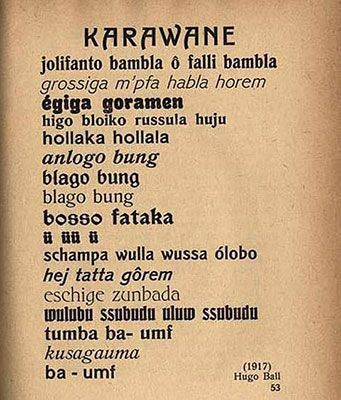
Karawane
Ball described his poetry as an effort to "return to the innermost alchemy of the word" to invent a new language outside of the conventional one. Of the phonetic verses that he created, which he called "Lautgedichte" ("sound poems"), he wrote:, "I don't want words that other people have invented... I want my own stuff, my own rhythm, and vowels and consonants too, matching the rhythm and all my own. If this pulsation is seven yards long, I want words that are seven yards long."
A sound poem essentially combines literary and musical composition to emphasize the central role of human speech in the reading or recitation of text. The artistry of sound poetry is its focus on "the phonetic aspects of human speech" rather than on semantics or syntax. By its nature, a sound poem is meant to be performed rather than simply read silently. The Dadaist sound poems differed from their predecessors - those of the Italian Futurists, particularly Marinetti. Whereas Marinetti's poems relied heavily on onomatopoeia as with, for instance, "Zang Tumb Tumb," which described the events of a battle, Ball's sound poems were meant to disconnect completely from coherent language.
The Dadaists invented two major variations on Ball's sound poetry. The first, bruitist poetry, was similar to that of Italian Futurists in its reliance on onomatopoeia for effect. The second was simultaneous poetry, which involved several people reading poems in different languages and using contrasting tonalities and rhythms at the same time. Tristan Tzara, who replaced Ball as leader of the Zurich Dada group, was the inventor of the simultaneous poem.
Sound poetry is thought to have been a strictly 20th-century invention, although some scholars have argued that it was rooted in the traditions of oral poetry. Either way, what is unique about sound poetry is its emphasis on the nonsensical, on refusing rather than reinforcing meaning. The Dadaists felt they were both destroying language and literature, which they thought had been debased by specific modern conditions such as war and imperialism, and reinventing it.
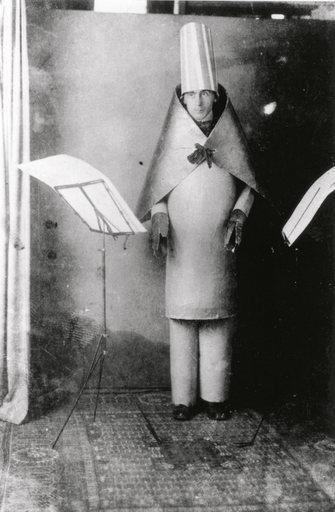
Costume of Hugo Ball at his reciting of the Sound Poem, 'Karawane'
Cabaret VoltaireBall was not new to performance when he stood in front of audiences at the Cabaret Voltaire to recite his sound poems. Between 1910 and 1913, he had begun a career in the theater. He first studied acting with Max Reinhardt and also directed and worked as stage manager at a variety of theater companies in Munich, Berlin, and Plauen. He aspired to create a kind of theater grounded in the concept of Gesamtkunstwerk, "a synthesis of all the arts," that he believed had the potential to provoke social transformation. So the light, sound, and visual parts all combined into a complete work of art.
In his journal, he described how the performance of Karawane had reminded him of attending Catholic Mass as a child, having delivered the string of nonsensical words with an almost liturgical sobriety. For the event, he began offstage, in the dark. He continued speaking as he mounted the stage and entered the lighted space, where the audience could now see rather than simply hear him.
Ball had produced a costume made from everyday material - primarily cardboard but also paint and fabric to tie the cumbersome "collar" around his neck. The costume was reflective of the absurd, nonsensical nature of Dada: he encased his legs and body in blue cardboard tubes. Lobster-claw like hands protruded from the tubes on his arms. Another sheet of cardboard, gold on the outside and red on the inside, formed an awkward collar that flapped when he moved his arms and a towering, chef's toque-like hat covered his head. The costume seems to have been a parody of the elaborate costume designs of avant-garde groups such as the Russian Constructivists and must surely have inspired the wildly creative designs for ballet costumes by Bauhaus designer, Oscar Schlemmer only a decade later.
 Ask The Art Story AI
Ask The Art Story AI